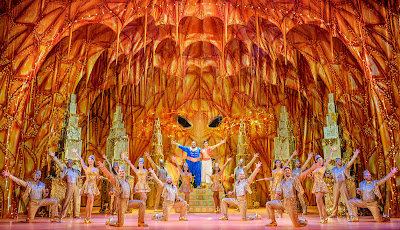Reviewed by James Karas
Disney’s Aladdin is musical theatre on a grand scale. It’s in its eighth year on Broadway and there is a touring company going across the United States to venues galore. It’s on tour in the United Kingdom and Ireland as well as Japan and Spain. Disney’s website tells us that more than 15 million people have seen it. Can intergalactic productions be far behind?
It is a popular show and I for one would not argue with the millions of viewers nor the enthusiastic full-house audience at The Princess of Wales theatre last Thursday. They enjoyed a grand show that may not be to everyone’s taste but they would not give a damn about the opinions of others. Quite right.
Unless you have been living on the outer stretches of civilization you know about the young urchin Aladdin who lived somewhere a long time ago. He meets a Genie who lives in a small oil lamp and Jasmine, a pretty princess and the daughter of the Sultan. He likes her and she likes him but don’t be so impatient.
We have the bad guys too. The meanie Jafa wants to eliminate the Sultan and get the throne. He is accompanied by the silly and very funny Iago. There are ten other characters and an army of singers and dancers in the plot of the musical but I will not hold you in suspense. In a couple of hours (plus intermission) the bad guys are defeated and Aladdin gets Jasmine and we all leave the theatre happy ever after.
But there is still work to be done so stay tuned. With about 20 musical numbers (some repeats) the evening passes with some nice songs, some loud numbers and almost non-stop singing and dancing. All is intended to generate excitement and give us a colorful show. Colorful is an understatement. Disney has costumes in middle eastern colors, gold and an array of changes that is intended to simply dazzle and bedazzle and overwhelm you. It works.
The show starts with the exuberant Genie of Marus M. Martin. He starts off on a high note and sings “Arabian Nights” with the ensemble and never slows down. We have the evil Jafar (Anand Nagraj) who wants to overthrow the Sultan (Sorab Wadia) and get his filthy hands on the kingdom and Jasmine. He has his sidekick Iago (Aaron Choi), a solid comic character from a different era.
Adi Roy is a handsome and energetic Aladdin and Senzel Ahmady is an alluring and pretty Jasmine and we root for them. They sing the simple melodies of “A Million Miles Away” and “A Whole New World” reasonably well and give us some quieter moments from the boisterous ensemble singing and dancing.
It is a musical and visual extravaganza and a relentless onslaught on all senses. I could have done with less (a lot less) volume but I suppose it is part of the combined assault that enthralls the audience.
The show is designed by Daniel Brodie and Directed and Choreographed by Casey Nicholaw. There is a small army of behind-the-scenes personnel including an illusion designer, a hair designer and many others. Nothing is left to chance. And yes, Aladdin and Jasmine do ride on the magic carpet.
_____________________________________
Aladdin by Alan Menken (music), Howard Ashman, Tim Rice and Chad Beguelin (lyrics) and Chad Beguelin (book) based on the Disney film continues until March 17, 2024, at the Princess of Wales Theatre, 300 King St. West, Toronto, Ontario. www.mirvish.com


%20-%202024%20Tarragon.jpg)










